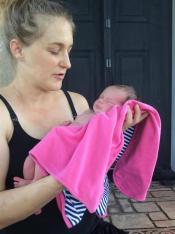Elisa Knopf
Elisa Knopf: Uncomplicated Pregnancies, Complicated Brain
"I am Elisa Knopf. I am a mother, a wife, a doula, a community organizer and a passionate soul. I have had three pregnancies. They were all uncomplicated, but that did not make it easier during the postpartum phase. Each experience was so hard it rocked me in a way that nothing else has. It was like walking through fire.
With all three I experienced postpartum rage and anxiety, which manifested itself towards my husband. That was hard. Marriages are not easy and postpartum rage can be really embarrassing. You feel like your spouse, your partner, is not able to handle you and so you feel very isolated.”

Career Woman
"With my first son, I noticed I was struggling when I went back to work. It was at about eight months postpartum. I noticed things within my personal relationships first, but work was the most challenging part for me, because my brain just was not operating in the way that I am used to.
There were four years in between the birth of my first and second child, so I didn't remember how hard the first postpartum experience had been. I was focusing on the good bits, but I started noticing right away that something was wrong. Luckily, I was working at home so I was not in the public eye. The challenges and difficulties I was having were very private.
With my third, I had to go back to work at five weeks postpartum. My other experiences did not really prepare me for how awful that was going to be. I thought it would not be that bad, that I'd done this before. Overall, I made better decisions with my third, but going back to work that soon kind of destroyed me.”

Treatment and Healing
"It is really hard to talk about mental health period. I feel like postpartum and pregnant women are invisible in the realm of mental health. Some women eventually get to the point where they develop coping mechanisms and they know themselves well enough to handle it or find ways to deal with it. I needed help.
When my first son was about two years old, I finally went and saw a counselor. I have been going to her for five years now. She knows me. She knows my story. She has always been able to help me find myself when I am feeling lost.
During my second postpartum experience, I went to the doctor because I developed this weird skin rash that women sometimes get. They were not really able to treat it, but the doctor and I ended up discovering Vistaril, which is a medication for rashes, but also for my anxiety. That was my first time receiving any kind of medication for my mood or anxiety disorder, and I use it to this day.”

A Safe Space for New Moms
"Mental health is a big deal. Once you call it out and say 'this is real, we can help you, it is totally treatable,' it makes all the difference.
We're growing a human and it makes our bodies change so much. If you are having a complication of the body, that is going to make anybody at risk for mental health challenges. When you are pregnant, it's hugely transformative. We know that. When a woman is challenged by a postpartum mental illness, it's like having a temporary disability.
As a doula, I am trained and practice creating space for women so that they can feel emotionally healthy and get the help that they need. I feel like society should broaden its laws and deepen its policies to yield to pregnant women. We need to start focusing on moms and ask, 'What does she really need? How can we make this better for her?' We do not have to stop doing business as usual, but if we can just yield to women, it will be okay.”
Some call it the baby blues and some call it postpartum depression, but there are a range of perinatal mood and anxiety disorders that can affect mothers. Click below for stories told by six Shasta County moms. Their honest stories don't sugarcoat motherhood. Instead, they share their hardships -- during and after pregnancy -- and how they found support and joy in motherhood.
